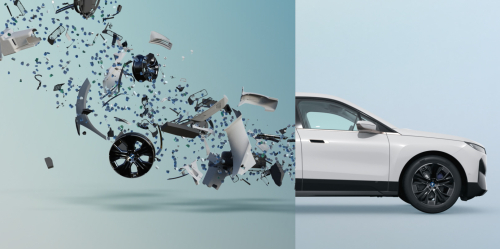With €6.4 million of support from the German Federal Ministry for Economic Affairs and Climate Action under its “New Vehicle and System Technologies” funding guidelines, the Car2Car project focuses on the materials aluminum, steel, glass, copper and plastic.

In future, innovative dismantling and automated sorting methods should allow far greater quantities of the resources recovered from end-of-life vehicles to be made suitable for use in the production of new cars than has so far been the case. This project also includes an end-to-end evaluation of both the ecological and economic impacts of closed-loop recycling of the materials being investigated.
The BMW Group is targeting increasing the proportion of secondary materials in its brands’ new models from around 30% at present to 50%. To help achieve this, the recyclability of the materials used is already taken into account during the design process for new models. Rethinking how materials are recovered from vehicles at the end of their product life cycle is also of key importance. The raw materials obtained from recycling can only be used as part of a circular economy if they also satisfy the high standards of quality the BMW Group expects of materials for premium cars.
The BMW Group is supplying 500 end-of-life vehicles for the purposes of the project. A variety of models from its own portfolio—ranging from MINI to Rolls-Royce cars with combustion engines, plug-in hybrid systems and all-electric drive units—are undergoing recycling to produce a representative spectrum. Here, the consortium partners will be looking into potential ways of improving closed vehicle material flows. They are setting out to evaluate how limiting the flow of materials to vehicles affects the quality and purity of secondary raw materials.
The Car2Car consortium is working out the optimum balance between the dismantling process and post-shredder technologies from a qualitative, economic and ecological perspective in order to retain as much of the value initially invested in the manufacturing of a car as possible.
Today’s recycling processes involve a high degree of manual effort and result in a loss of material purity—meaning they are only economically viable for a very small number of vehicle components. Car2Car aims to present sound recommendations for an innovative framework that will enable an efficient circular economy to deliver greater added value in future than is possible by following conventional, linear process chains.
Digital technology and artificial intelligence can be used to automate increasingly and to speed up recycling processes that have been performed manually up to now. The dismantling process, for example, can be partly or even highly automated with the help of robotics technology. The integration of systems for optical and AI-assisted detection and sorting of reusable materials in the post-shredder process brings about a significant improvement in the quality and purity of aluminum, steel, glass, copper and plastic materials.
In order to achieve this, the idea is to develop, among other things, sensor technology using AI-based materials detection and other spectroscopic methods (e.g. laser-induced plasma spectroscopy) that is capable of identifying different steel and aluminium alloys. In this way, it is possible to obtain raw materials with a far higher degree of purity. This increases the quantity of secondary raw materials suitable for the production of new cars, while also meaning that far less processing work is required to turn scrap into reusable raw materials. This applies to all materials.
The BMW Group is also heading up another consortium project entitled Future Sustainable Car Materials (FSCM). Under its lead, research institutes and companies are working together on innovative process routes and material concepts for sustainable use of secondary materials and for reducing the carbon footprint of raw materials such as steel and aluminium. The use of secondary aluminum is a prime example of how consistent use of recycled material can cut greenhouse gas emissions.
The BMW Group is also carrying out important groundwork when it comes to the actual recycling of vehicles at the end of their service life. The company is the only carmaker to run its own recycling center, which has been in operation since 1994. Up to 10,000 vehicles a year are processed at the Recycling and Dismantling Centre in Unterschleißheim near Munich. As well as being applied internally, the findings and solutions that emerge from this process are also made accessible to all players in the recycling industry.
The following consortium partners are participating in the Car2Car project:
BMW AG
TU Bergakademie Freiberg, Institute of Mechanical Process Engineering and Mineral Processing
TU Bergakademie Freiberg, Institute of Iron and Steel Technology
TU Bergakademie Freiberg, Institute of Glass and Glass Technology
Helmholtz Institute Freiberg for Resource Technology at HZDR
Technical University of Munich, Professorial Chair of Circular Economy
Technical University of Munich, Chair of Materials Handling, Material Flow, Logistics
Technical University of Munich, Institute for Machine Tools and Industrial Management
Scholz Recycling GmbH
STEINERT UniSort GmbH
thyssenkrupp Steel Europe AG
Salzgitter Mannesmann Forschung GmbH
Aurubis AG
Novelis Deutschland GmbH
OETINGER Aluminum GmbH
Pilkington Automotive Deutschland GmbH